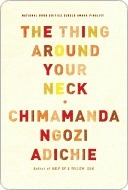More on this book
Community
Kindle Notes & Highlights
At first, when she had come to America to have the baby, she had been proudly excited because she had married into the coveted league, the Rich Nigerian Men Who Sent Their Wives to America to Have Their Babies league. Then the house they rented was put up for sale. A good price, Obiora said, before telling her they would buy. She liked it when he said “we,” as though she really had a say in it. And she liked that she had become part of yet another league, the Rich Nigerian Men Who Owned Houses in America league.
Our men like to keep us here, she had told Nkem. They visit for business and vacations, they leave us and the children with big houses and cars, they get us housegirls from Nigeria who we don’t have to pay any outrageous American wages, and they say business is better in Nigeria and all that. But you know why they won’t move here, even if business were better here? Because America does not recognize Big Men. Nobody says “Sir! Sir!” to them in America. Nobody rushes to dust their seats before they sit down.
Later, Chika will read in The Guardian that “the reactionary Hausa-speaking Muslims in the North have a history of violence against non-Muslims,” and in the middle of her grief, she will stop to remember that she examined the nipples and experienced the gentleness of a woman who is Hausa and Muslim.
I often want to tell Nkiru that her mother visits weekly in the harmattan and less often during the rainy season, but if I do, she will finally have reason to come here and bundle me back with her to America and I will be forced to live a life cushioned by so much convenience that it is sterile.
“Half-caste” was what they had called children like him back in Nigeria, and the word had meant an automatic cool, light-skinned good looks, trips abroad to visit white grandparents. Kamara had always resented the glamour of half-castes.
She had come to understand that American parenting was a juggling of anxieties, and that it came with having too much food: a sated belly gave Americans time to worry that their child might have a rare disease that they had just read about, made them think they had the right to protect their child from disappointment and want and failure. A sated belly gave Americans the luxury of praising themselves for being good parents, as if caring for one’s child were the exception rather than the rule.
He laughed and said the job was good, was worth living in an all-white town even though his wife had to drive an hour to find a hair salon that did black hair. The trick was to understand America, to know that America was give-and-take. You gave up a lot but you gained a lot, too.
You wanted to write that rich Americans were thin and poor Americans were fat and that many did not have a big house and car; you still were not sure about the guns, though, because they might have them inside their pockets.
You looked at them and felt grateful that they did not examine you like an exotic trophy, an ivory tusk.
He prayed in that particularly Nigerian Pentecostal way that made her uneasy: he covered things with the blood of Jesus, he bound up demons and cast them in the sea, he battled evil spirits. She wanted to interrupt and tell him how unnecessary it was, this bloodying and binding, this turning faith into a pugilistic exercise; to tell him that life was a struggle with ourselves more than with a spear-wielding Satan; that belief was a choice for our conscience always to be sharpened.
It was what Udenna had said about the Nigerian student at Wharton whose friendship he consistently snubbed, whose e-mails he never replied to. The student, with his giveaway forehead and bush ways, simply did not make the cut. Make the cut.
He was always struggling to be different, even when it didn’t matter. It was as if he was performing his life instead of living his life.”
“The last name I use here is different, too. Americans have a hard time with Udenwa, so I changed it.” “What is it?” I was still trying to get used to Udenwa, a name I had known only a few weeks. “It’s Bell.” “Bell!” I had heard about a Waturuocha that changed to Waturu in America, a Chikelugo that took the more American-friendly Chikel, but from Udenwa to Bell? “That’s not even close to Udenwa,” I said. He got up. “You don’t understand how it works in this country. If you want to get anywhere you have to be as mainstream as possible. If not, you will be left by the roadside. You have to use
...more
“See how they have bars so you can’t take the shopping carts out? In the good neighborhoods, they don’t have them. You can take your shopping cart all the way to your car.” “Oh,” I said. What did it matter that you could or could not take the carts out? The point was, there were carts. “Look at the people who shop here; they are the ones who immigrate and continue to act as if they are back in their countries.” He gestured, dismissively toward a woman and her two children, who were speaking Spanish. “They will never move forward unless they adapt to America. They will always be doomed to
...more
make a clear link between education and dignity, between the hard, obvious things that are printed in books and the soft, subtle things that lodge themselves into the soul.


